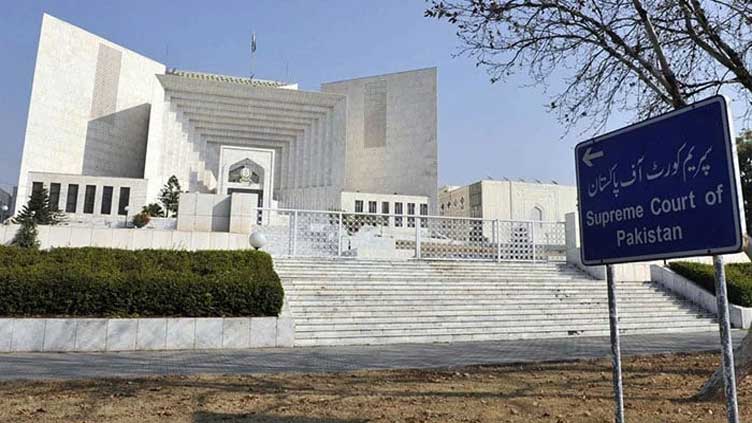ISLAMABAD – A bench of the Supreme Court on Monday discharged the contempt proceedings against Additional Registrar (Judicial) Nazar Abbas in a matter related to fixation of cases.
The two-member bench comprising Justice Mansoor Ali Shah and Justice Aqeel Ahmed Abbasi issued the order, which was reserved last week.
“Upon examining the case of the present alleged contemner, the Additional Registrar (Judicial) of this Court, we find that he did not deliberately avoid the fixation of the cases before the Bench as directed in the court order. There is no evidence to suggest that he had any personal interest in the matter or had connived with any of the parties to the case, nor did he act with the intention of causing damage to any of the parties to the case. There is no indication of mala fide intent in his actions,” read the judge.
In the absence of any such factors or elements of contumacy, his conduct cannot be considered contumacious, nor can it be said to have suffered from mala fides, requiring contempt proceedings against him, it added.
However, the two-member bench asked the chief justice of Pakistan (CJP) to make full court of the Supreme Court to decide whether it should proceed further against the members of Practice and Procedure Committee and the Judges’ Constitutional Committee for disregarding the court order.
“Both the Committees were not legally authorized to take administrative decisions dated 17 January 2025 in violation of the judicial order. In this background, it appears that the matter has to proceed further against the members of the two Committees. However, judicial propriety and decorum demand that the said question be considered and decided by the Full Court of the Supreme Court so that it is authoritatively decided once and for all,” read the order.
The unsavoury situation erupted when a three-member bench comprising Syed Mansoor Ali Shah, Ayesha A. Malik, and Irfan Saadat Khan, JJ. heard certain cases, including a challenge to the constitutionality of a law, on 13 January 2025. At the outset of the proceedings, an objection was raised regarding the Bench’s jurisdiction to hear these cases.
After hearing arguments of the learned counsel on the jurisdictional objection, the Bench adjourned the hearing to 16 January 2025 by allowing time to the learned counsel for the parties to make preparation to further assist the Court on the points concerning the jurisdictional objection.
On 16 January 2025, the three-member Bench stood reconstituted, with Aqeel Ahmed Abbasi, replacing Irfan Saadat Khan, and the said cases were posted before the reconstituted Bench. However, the reconstituted Bench could not proceed with the hearing, as Aqeel Ahmed Abbasi was one of the two judges who had delivered the impugned judgment in these cases in the Sindh High Court.
Consequently, the reconstituted bench comprising Syed Mansoor Ali Shah, Ayesha A. Malik and Aqeel Ahmed Abbasi directed the office, by its order dated 16 January 2025, to fix these cases before the earlier Bench on 20 January 2025, at 1:00 pm.
On 20 January 2025, a counsel in the cases appeared before the bench and pointed out that the cases had not been fixed for hearing as per the court order.
The Bench called for the Additional Registrar (Judicial); however, due to his unavailability, the Deputy Registrar (Judicial) appeared. The Deputy Registrar confirmed that the cases had not been fixed on that day before any regular Bench but had instead been fixed for hearing before the Constitutional Bench on 27 January 2025, pursuant to the decision of the Committee constituted under the Supreme Court (Practice and Procedure) Act, 2023 (“Act”).
He further submitted that the decision of the Committee had not yet been communicated to the office, in writing.
“Upon receiving information of these facts, the said Bench initiated suo motu contempt proceedings against the Additional Registrar (Judicial) for defiance of the court order and for obstructing the administration of justice,” the order explained.













